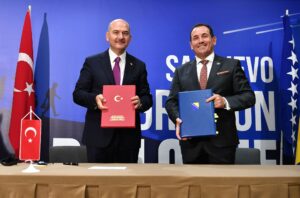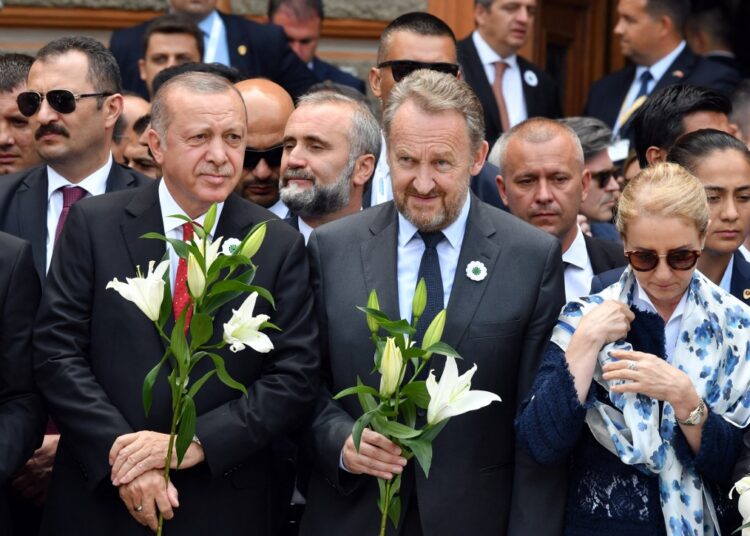Nordic Monitor/Stockholm
Turkey and Bosnia have entered into a security cooperation agreement that includes operational intelligence sharing, training and equipment donation, prompting concern that Turkey may use the agreement to export human rights violations to Bosnia.
In the text of the agreement, obtained by Nordic Monitor, the two countries pledge to cooperate in fighting transnational organized crime, including money laundering, cybercrime, migrant smuggling, terrorism and economic and financial crime.
The agreement, currently awaiting approval in the Turkish parliament, was signed on September 20, 2020. It is expected to soon clear both the parliamentary committee and general assembly.
The provisions in the agreement concerning cooperation on terrorism offenses spell trouble for Bosnian authorities considering how the government of President Recep Tayyip Erdogan brands all of his critics, opponents and dissidents as terrorists.
In recent years, hundreds of thousands of Turks, including journalists, politicians, lawyers and human rights defenders, have been investigated, prosecuted and/or sentenced to prison time under Turkey’s much-abused terrorism laws in sham trials despite the fact that they had nothing to do with terrorism or violence.
Turkish president’s letter submitted to parliament seeking approval of the agreement with Bosnia:
It’s no surprise that Turkey is by far the leader in the number of prisoners convicted of terrorism in Europe according to the 2021 Council of Europe Annual Penal Statistics on Prison Populations report, better known as SPACE I, released in April 2022. The report showed 32,006 people convicted of a terrorism-related crime are currently behind bars in 47 European countries including Turkey.
A total of 30,555 of these people, or 95 percent in the entire prison population in Europe, are in Turkish prisons on terrorism convictions. Turkey is followed by the Russian Federation with 1,026 prisoners, or 3.2 percent of the total number of terrorism prisoners. Spain is in third place with 195 inmates.
Erdogan’s turning the criminal justice system into a tool for cracking down on dissent has been criticized by international human rights organizations and the United Nations.
As a result, this poses a challenge for Bosnian authorities when it comes to implementation of the agreement on cooperation in combatting terrorism-related offenses and sharing its experience with Turkey.

Article 2 of the agreement, which covers cooperation on terrorism offenses, states that “cooperation in the fight against terrorism shall include, in particular, cooperation relating to the exchange of information, intelligence and assessments, and operational cooperation on terrorist organizations and their modus operandi, terrorist acts, terrorist financing, affecting the security of the Parties, and techniques and methods used in the prevention, countering and suppression of terrorism.”
The Gülen movement, a group inspired by Erdogan foe Fethullah Gülen, who lives in the US, has borne the brunt of this crackdown for nearly a decade. President Erdogan turned against the Gülen movement after major corruption investigations in December 2013 that incriminated Erdogan, his family members and his business and political associates.
In February 2014, two months after the bribery scandal shook his government, Erdogan orchestrated terrorism investigations into the movement without any evidence that Gülen or people affiliated with the movement had committed any terrorist acts. In May 2016, in a politically motivated move. the Erdogan government designated the movement as a terrorist group.
During parliamentary deliberations on the approval of similar security protocols with other countries, Turkish government officials openly admitted that such agreements would contribute to the Turkish government’s efforts to suppress people affiliated with the Gülen movement in other countries.
What is more, at the insistence of Turkish officials, the agreement includes provisions on how to regulate the media in fighting against terrorism offenses, which has been a continuing pattern in such agreements signed by Turkey with dozens of countries in recent years, especially with countries that have problems in democracy, human rights and freedom of the press.
The agreement states that “In combatting terrorism, the Parties shall prevent the activities of the visual and written media organs of terrorist organizations and their front institutions operating in their territories against the other Party and the both Parties consider them as terrorist organizations and take appropriate measures in this regard according to their national legislations.”
Full text of the security cooperation agreement between Turkey and Bosnia:
The Erdogan government has used terrorism laws to shut down nearly 200 media outlets since 2016, including the country’s most highly circulated daily, Zaman, and leading TV networks, and has imprisoned well over 100 journalists on fabricated terrorism charges. The government also went after journalists living outside Turkey and asked European governments to force them to return home in order to silence their voices. European countries rejected Turkey’s demands, making clear that journalistic activity is not considered a terrorism offense in democracies.
President Erdogan submitted the 12-article agreement to parliament for ratification on March 31, and the Speaker’s Office sent the agreement for debate to the Foreign Affairs Committee on April 3.
The two countries have also committed themselves to exchanging information by monitoring the movement of technological equipment and all kinds of weapons and ammunition that could be used in the preparation and perpetration of terrorist acts with the aim of preventing the terrorist organizations from acquiring that equipment.
The agreement allows both sides to appoint liaison officers and other experts on crime to increase the efficiency of interaction and coordination of joint actions. According to the text, the parties will carry out training programs and courses and conduct projects for analyzing the nature, dynamics and forms of terrorism.
The text was signed in Sarajevo by Turkish Interior Minister Süleyman Soylu and his Bosnian counterpart, Selmo Cikotic, the then-security minister of Bosnia. The agreement is valid for five years and will be automatically extended. According to the text, either party must notify the other of the intent to terminate at least six months in advance.












